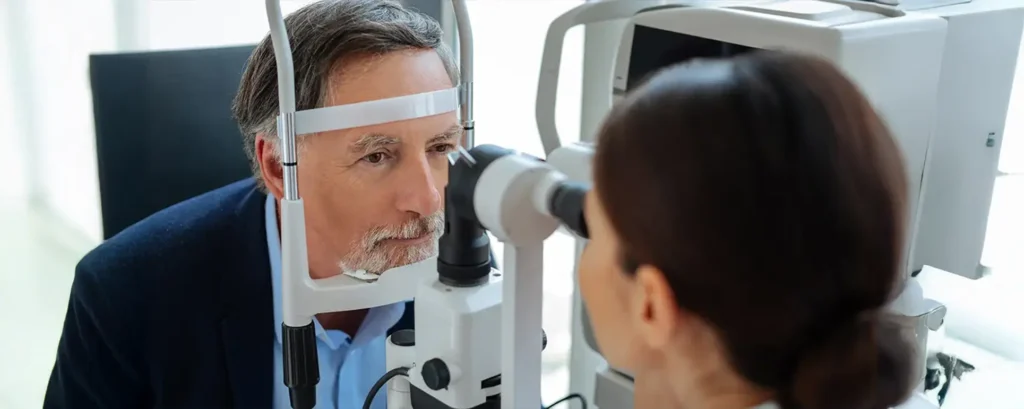Testosterone replacement therapy (TRT) has become much more common over the last decade. More men are recognising the impact that low hormone levels can have on their energy, mood, and overall health — and are turning to TRT as a solution. But as with any long-term treatment, questions arise about possible side effects. One area that often gets overlooked is eye health, particularly the risk of developing cataracts.
Cataracts remain one of the most common causes of vision problems in the UK, and while they are usually linked with age, lifestyle, and certain medical conditions, some people are beginning to ask whether testosterone could play a role too. If you’re on TRT or considering it, it’s worth knowing whether your eyes could be affected and what steps you should take to stay safe.
In this article, we’ll walk through everything you need to know. We’ll explain what cataracts are, look at the current evidence around testosterone therapy and eye health, discuss other risk factors you can actually control, and finish with clear steps on how to protect your vision.
Understanding Cataracts
Cataracts happen when the natural lens inside your eye becomes cloudy. Normally, the lens is clear and allows light to pass through to the retina, where images are formed. But over time, proteins in the lens can clump together, leading to blurred or hazy vision. At first, cataracts may be subtle, but they usually get worse with age.
Symptoms often include increased glare from lights, difficulty seeing at night, faded colours, or the need to change your glasses prescription more frequently. Left untreated, cataracts can lead to significant vision loss, although surgery can successfully restore clear sight in the vast majority of cases.
While age is the biggest factor, other things can speed up the process. Smoking, diabetes, prolonged UV exposure, steroid medication, and family history all play a part. And now, researchers are starting to explore whether hormone therapy — including testosterone — could be another piece of the puzzle.
Testosterone Therapy: Why It’s Used
Testosterone is a hormone that plays a vital role in men’s health. It supports muscle mass, bone density, energy levels, libido, and mood. As men get older, natural testosterone levels gradually decline, but for some the drop is significant enough to cause troubling symptoms. TRT aims to restore levels to a healthy range, improving quality of life.
Treatment can be given through injections, gels, patches, or implants. Many men find that TRT helps them feel more energised, focused, and confident. But like all medical treatments, it’s not without potential downsides. Doctors usually monitor blood counts, prostate health, and cardiovascular risk during therapy. What’s less commonly discussed is whether testosterone has any long-term impact on your eyes.
The Research on Testosterone and Cataracts

Here’s where it gets tricky: research on testosterone therapy and cataracts is still very limited. Unlike age, diabetes, or steroid use — which are well-established cataract risk factors — the connection with testosterone hasn’t been clearly proven.
Some early observational studies have suggested that men on TRT might have a slightly higher rate of cataract surgery compared with those not receiving hormone therapy. But these findings aren’t conclusive. Many men who go on TRT already have other health conditions, such as diabetes or obesity, which themselves increase cataract risk. It’s difficult to separate one factor from another.
Other research has found no significant link between testosterone levels and cataract development. In fact, some scientists argue that hormones may even play a protective role in maintaining eye tissue health, although this evidence is far from definitive.
At present, the best way to sum it up is this: there’s no strong evidence that testosterone therapy directly causes cataracts, but researchers can’t rule out a small influence. More long-term studies are needed before we can be certain either way.
How Testosterone Could Affect the Eye
Although the clinical evidence is limited, scientists have looked into how testosterone might theoretically affect the eye. The lens is sensitive to oxidative stress — essentially, damage caused by free radicals. Hormones like testosterone could potentially influence how cells handle this stress.
Testosterone receptors are present in some eye tissues, suggesting the hormone does play at least a minor role in eye health. It’s possible that high or fluctuating levels might disturb the balance of proteins in the lens, making cataract formation more likely. But again, this remains largely hypothetical, with no solid proof in humans so far.
It’s worth remembering that many medications, from steroids to certain antidepressants, have been linked with cataracts after years of use. So while testosterone is not currently on that list in any official way, doctors are keeping an eye on the research.
Known Cataract Risk Factors You Can Control

Even if testosterone does turn out to play a role, it’s likely to be small compared with the major risk factors we already know about. These include:
- Smoking – one of the biggest preventable causes.
- UV light exposure – not wearing sunglasses can accelerate lens damage.
- Diabetes – poor blood sugar control increases cataract risk.
- Steroid medications – long-term use is a proven factor.
- Poor diet – lacking antioxidants like vitamin C, vitamin E, and lutein.
- Obesity and high blood pressure – often linked with faster lens changes.
If you’re on TRT, paying attention to these lifestyle areas will do more for protecting your eyes than worrying about the hormone itself.
Protecting Your Eye Health on Testosterone Therapy
If you’re taking testosterone, here are some practical steps you can follow to keep your vision safe:
- Have regular eye tests – once a year is a sensible minimum after age 50, or sooner if you notice any changes.
- Wear sunglasses – make sure they block 100% of UVA and UVB rays.
- Keep diabetes under control – managing blood sugar protects your eyes as well as your overall health.
- Don’t smoke – quitting reduces cataract risk and benefits your cardiovascular health too.
- Eat for your eyes – foods rich in antioxidants, leafy greens, citrus, and oily fish all help.
- Discuss openly with your doctor – let them know about any vision changes while on TRT.
What the Future of Research Might Show
The next decade should bring clearer answers. As TRT use continues to grow, researchers will be able to track larger groups of men over longer periods. This could help reveal whether there is a genuine connection with cataracts, or whether the current hints are just coincidence.
It’s also possible that different forms of testosterone delivery (gel vs injection, for example) could have different effects, though no evidence currently supports this idea. For now, what matters most is staying proactive about your eye health, regardless of your hormone therapy.
FAQs: Testosterone Therapy and Cataracts
- Does testosterone therapy cause cataracts?
At the moment, there is no strong evidence that testosterone therapy directly causes cataracts. Some studies have suggested a possible link, but these results are far from conclusive and may be influenced by other factors such as age, diabetes, or lifestyle choices. Researchers agree that more long-term studies are needed before we can say for certain whether testosterone plays a meaningful role in cataract development. - Should I stop testosterone if I’m worried about cataracts?
You shouldn’t stop testosterone therapy without first speaking to your doctor. TRT is often prescribed to improve energy, mood, and overall quality of life, and stopping suddenly could create more problems than it solves. The sensible approach is to continue therapy under medical supervision while making sure you attend regular eye check-ups so that any early changes to your vision can be picked up quickly. - How often should I have an eye test on TRT?
If you are over 50, or you already have other risk factors such as diabetes, it’s recommended to have a comprehensive eye examination at least once a year. An annual check-up allows your optometrist or ophthalmologist to detect cataracts in the early stages, when they may be easier to manage. If you notice new symptoms like glare from lights or blurred vision, you should book an appointment sooner rather than waiting until your next scheduled test. - Can cataracts be reversed without surgery?
Unfortunately, once cataracts have formed, they cannot be reversed with lifestyle changes, eye drops, or supplements. The only effective treatment is cataract surgery, which involves replacing the cloudy lens with a clear artificial lens. That said, healthy habits such as protecting your eyes from UV rays, not smoking, and eating a diet rich in antioxidants may help slow down the progression of cataracts and keep your eyes healthier for longer. - Do testosterone gels or injections affect cataracts differently?
There is no evidence to suggest that the method of testosterone delivery—whether by gel, injection, patch, or implant—has any effect on cataract risk. Regardless of how testosterone enters the body, it circulates in the bloodstream and reaches tissues in a similar way. This means your choice of delivery method is more likely to be based on convenience, cost, or preference, rather than eye health concerns. - What are the early warning signs of cataracts?
The earliest signs of cataracts can include blurred or cloudy vision, glare around bright lights, difficulty driving at night, and colours appearing more faded or yellowed than before. Some people also find that they need to change their glasses prescription more often. These symptoms may start off mild but usually progress gradually, so noticing them early is important in order to arrange an eye test. - Could low testosterone itself cause cataracts?
There isn’t enough evidence to say that low testosterone on its own increases cataract risk. Some researchers believe hormones play a role in protecting tissues from oxidative stress, but so far, no direct link has been proven between low testosterone and cataract development. What’s clear is that age, diabetes, smoking, and UV exposure remain much stronger and more established risk factors for cataracts. - Are women on hormone therapy at risk of cataracts?
Hormone therapy in women, particularly oestrogen replacement after menopause, has actually been linked with a possible reduction in cataract risk in some studies. This suggests that sex hormones can influence lens health, but the effects are not the same across men and women. Testosterone therapy in men hasn’t shown the same protective effect, and the data remains inconclusive about whether it increases cataract risk. - Can diet and supplements protect against cataracts?
A healthy diet rich in antioxidants like vitamin C, vitamin E, lutein, and zeaxanthin can support eye health and may help slow cataract progression. Supplements are an option if your diet is lacking in these nutrients, but they should not replace balanced eating or regular eye care. Good nutrition won’t reverse existing cataracts, but it can play an important role in reducing overall risk and supporting healthier eyes as you age. - Does testosterone affect cataract surgery results?
There is no evidence that being on testosterone replacement therapy affects the outcome of cataract surgery. Modern cataract procedures are highly successful, with most people experiencing significantly clearer vision afterwards. As long as your overall health is stable and your doctors are aware of your TRT, surgery can usually be carried out without complications related to hormone therapy.
Final Thoughts
Testosterone therapy is helping many men regain quality of life, but it’s only natural to ask questions about possible long-term effects. At present, there is no proven link between TRT and cataracts, but staying cautious and protecting your eyes makes sense. Regular check-ups, a healthy lifestyle, and open conversations with your doctor will go a long way.
If you’d like peace of mind about your eye health, consider arranging an assessment with a specialist clinic such as the London Cataract Centre.
References
- Henderson, M., Tuteja, S.Y. and Lockington, D. (2025) ‘Literature review of sex hormones and cataract development, with modern implications’, Clinical & Experimental Ophthalmology, online ahead of print. Available at: https://pubmed.ncbi.nlm.nih.gov/40331249/ (Accessed: 23 August 2025).
- Lindblad, B.E., Håkansson, N., Philipson, B. and Wolk, A. (2010) ‘Hormone replacement therapy in relation to risk of cataract extraction: a prospective study of women’, Ophthalmology, 117(3), pp. 424–430. Available at: https://www.sciencedirect.com/science/article/abs/pii/S0161642009009063 (Accessed: 23 August 2025).
- Aina, F.O., Smeeth, L., Hubbard, R., Hurt, L.S. and Fletcher, A.E. (2006) ‘Hormone replacement therapy and cataract: a population-based case–control study’, Eye, 20(4), pp. 417–422. Available at: https://www.nature.com/articles/6701877 (Accessed: 23 August 2025).
- Freeman, E.E., Muñoz, B., Schein, O.D. and West, S.K. (2001) ‘Hormone replacement therapy and lens opacities: The Salisbury Eye Evaluation project’, Archives of Ophthalmology, 119(12), pp. 1687–1692. Available at: https://jamanetwork.com/journals/jamaophthalmology/fullarticle/268567 (Accessed: 23 August 2025).
- Hales, A.M., Chamberlain, C.G., Murphy, C.R. and McAvoy, J.W. (1997) ‘Estrogen protects lenses against cataract induced by transforming growth factor-beta (TGF-β)’, Journal of Experimental Medicine, 185(2), pp. 273–282. Available at: https://rupress.org/jem/article/185/2/273/7084/Estrogen-Protects-Lenses-against-Cataract-Induced (Accessed: 23 August 2025).

